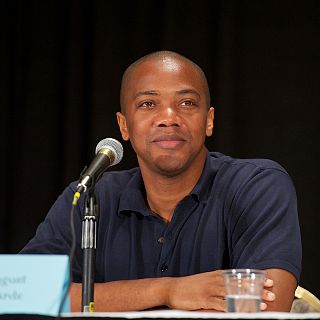A Quote by Jess Walter
I think suspense should be like any other color on a writer's palette. I suppose I'm in the minority but I think it's crazy for 'literary fiction' to divorce itself from stories that are suspenseful, and assign anything with cops or spies or criminals to some genre ghetto.
Related Quotes
The Booker thing was a catalyst for me in a bizarre way. It’s perceived as an accolade to be published as a ‘literary’ writer, but, actually, it’s pompous and it’s fake. Literary fiction is often nothing more than a genre in itself. I’d always read omnivorously and often thought much literary fiction is read by young men and women in their 20s, as substitutes for experience.
[Michael] Chabon, who is himself a brash and playful and ebullient genre-bender, writes about how our idea of what constitutes literary fiction is a very narrow idea that, world-historically, evolved over the last sixty or seventy years or so - that until the rise of that kind of third-person-limited, middle-aged-white-guy-experiencing-enlightenment story as in some way the epitome of literary fiction - before that all kinds of crazy things that we would now define as belonging to genre were part of the literary canon.
I suppose in some ways, all over the world "crazy" is a term of abuse and I think that is something that should be stopped. In Ireland "crazy" is a term of abuse and people are terrified of anything that they conceive to be crazy. And the people believed to be crazy won't be treated compassionately, they will treat you horribly and use it as a reason to dismiss anything you would think, do, say or feel, so you're rocking into a self esteem trap.
I'm now much more excited about genre distinctions. What I still see breaking down are more the hierarchical arrangements of genres. That is, "There is literary fiction, and then there are lesser genres." I'm much more clear on the idea that literary fiction is itself a genre. It is not above other genres. It is down there in the muck with all the other genres, and it's doing the wonderful things that it does, but to give it a Y-axis, to make it high and low, just seems absurd. I stand by that.
I like black for clothes, small items, and jewelry. It's a color that can't be violated by any other colors. A color that simply keeps being itself. A color that sinks more somberly than any other color, yet asserts itself more than all other colors. It's a passionate gallant color. Anything is wonderful if it transcends things rather than being halfway.
Everybody's going to do the 3D slightly differently the same way that people are going to deal with color differently. Some movies downplay the color, some color is very vibrant. Color design is very different. We've got to think of 3D like color or like sound, as just part of the creative palette that we paint with and not some whole new thing that completely redefines the medium.
I still read romance, and I read suspense. I read them both. And part of it is, I like stories with strong characters, and I like stories where there's closure at the end. And I like stories where there's hope. That's a kind of empowerment. I think romance novels are very empowering, and I think suspense novels are, too.
I do love science fiction, but it's not really a genre unto itself; it always seems to merge with another genre. With the few movies I've done, I've ended up playing with genre in some way or another, so any genre that's made to mix with others is like candy to me. It allows you to use big, mythic situations to talk about ordinary things.
My first book came out again - the re-issue from 2001. I was rereading it to make sure that I didn't miss any mistakes, and I didn't know who had written some of these stories. I really didn't. I am a different person now. It's weird. I think if stories are good, they have to have a life of their own that's independent of the writer. I like to think of my characters out there in other peoples' heads. That's a nice thing to think about.

































